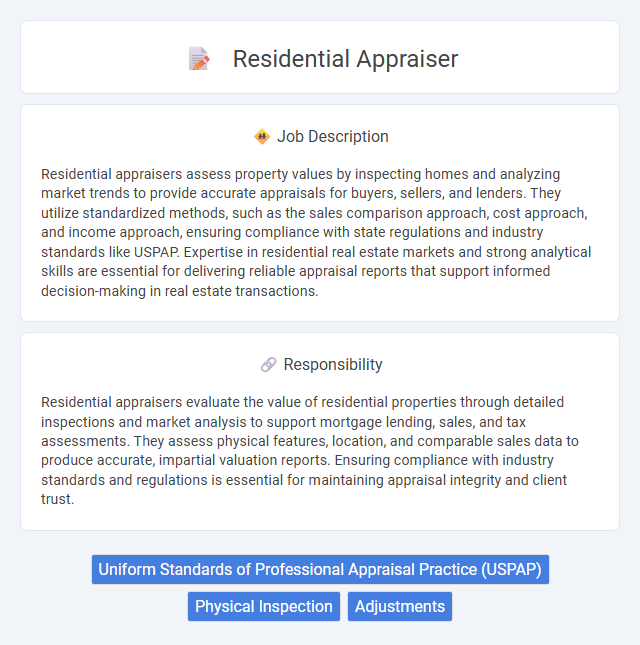
Residential appraisers assess property values by inspecting homes and analyzing market trends to provide accurate appraisals for buyers, sellers, and lenders. They utilize standardized methods, such as the sales comparison approach, cost approach, and income approach, ensuring compliance with state regulations and industry standards like USPAP. Expertise in residential real estate markets and strong analytical skills are essential for delivering reliable appraisal reports that support informed decision-making in real estate transactions.
Individuals who possess strong analytical skills and attention to detail are likely suitable for a residential appraiser job. Those comfortable working independently and handling complex property evaluations may find this role fulfilling. People who prefer routine physical activity and can maintain objectivity under pressure could have a higher probability of success in this career.
Qualification
Residential appraisers must hold a state-issued license or certification, typically requiring completion of specific education hours, including appraisal principles and procedures. Candidates must also accumulate supervised experience, often totaling 1,000 to 2,500 hours over 6 to 24 months, depending on the license level, such as Trainee, Licensed Residential, or Certified Residential appraiser. Continuing education is essential to maintain licensure and stay updated with industry standards, appraisal methods, and regulatory compliance.
Responsibility
Residential appraisers evaluate the value of residential properties through detailed inspections and market analysis to support mortgage lending, sales, and tax assessments. They assess physical features, location, and comparable sales data to produce accurate, impartial valuation reports. Ensuring compliance with industry standards and regulations is essential for maintaining appraisal integrity and client trust.
Benefit
Residential appraisers likely provide critical benefits by accurately estimating the market value of homes, which can enhance decision-making for buyers, sellers, and lenders. Their evaluations may reduce financial risks by ensuring fair pricing and supporting mortgage approvals. Reliable appraisals could also contribute to a stable real estate market by promoting transparency and trust among parties involved.
Challenge
Residential appraisers likely face the challenge of accurately assessing property values amidst fluctuating real estate markets and diverse property conditions. They probably need to interpret complex data, including comparable sales and market trends, which may require thorough analysis and professional judgment. The responsibility to provide unbiased, compliant appraisals could also present difficulties in maintaining precision and credibility in their reports.
Career Advancement
Residential appraisers can advance their careers by obtaining advanced certifications such as the Certified Residential Appraiser or transitioning to commercial appraisal roles, which often offer higher earning potential. Gaining expertise in specialized appraisal areas, including green building valuations or litigation support, further enhances career prospects. Continuous education and networking through professional organizations like the Appraisal Institute promote upward mobility within the real estate valuation industry.
Key Terms
Uniform Standards of Professional Appraisal Practice (USPAP)
Residential appraisers conduct property valuations following the Uniform Standards of Professional Appraisal Practice (USPAP) to ensure accuracy and consistency. USPAP establishes ethical standards and performance requirements crucial for appraisers when assessing residential real estate. Compliance with USPAP guidelines enhances credibility and supports sound financial decision-making in the housing market.
Physical Inspection
Residential appraisers conduct thorough physical inspections to evaluate property conditions, including structural integrity, roofing, foundation, and HVAC systems. They document interior and exterior features, measure the living area, and note any upgrades or damages that affect market value. Accurate data collection during the inspection ensures reliable appraisal reports used for mortgage lending and real estate transactions.
Adjustments
Residential appraisers analyze property features and market data to determine fair home values, applying adjustments for differences in size, condition, location, and amenities. These adjustments correct for variances between comparable sales and the subject property, ensuring accurate valuation by reflecting market preferences and seller motivations. Precise adjustments increase appraisal reliability, influencing mortgage approvals and real estate investment decisions.
 kuljobs.com
kuljobs.com